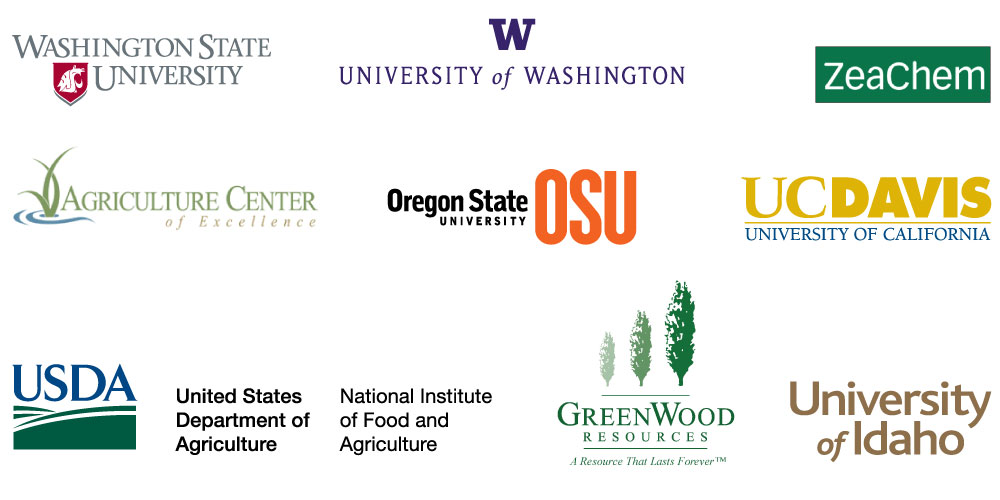Who We Are
Advanced Hardwood Biofuels Northwest (AHB) was a program funded by the USDA National Institute of Food and Agriculture. AHB integrated research, education, and extension to develop the framework for a poplar-based biofuel and bio-based chemical industry in the Pacific Northwest. The project ran from 2011 to 2019.

To watch more videos about the AHB project visit our Video Library.
What We Do
AHB is focused on laying the foundation for a renewable biofuels and bio-based chemical industry. High value chemicals, such as acetic acid, ethyl acetate, ethylene, and cellulosic ethanol, which are produced during the first stages of the biofuel production process, can be used to make bioproducts including paints and plastics.
The longer-term goal is to develop poplar-based biofuels including jet fuel, diesel, and gasoline that can supplement fossil fuels. These biofuels will be certified to run in conventional car, truck, and aircraft engines and will be 100% compatible with existing infrastructure.
AHB is interdisciplinary, investigating feedstock production, conversion technology, sustainability, and bioenergy education. The AHB Extension team provides resources to stakeholders, including research results, policy briefings, infosheets, videos, webinars, field tours, and workshops on biofuels and other energy issues.
Why Biofuels Matter
- Reduced Greenhouse Gas Emissions: The global warming potential of poplar-based biofuels is 35-97% lower than petroleum-based fuels.
- Economy: Job creation and rural development.
- Energy Security: Locally-made renewable fuels reduce the dependence on foreign oil.
- Environmental Benefits: Poplars can be grown to assist with wastewater treatment, clean contaminated soils, and provide soil and wildlife benefits.
- Infrastructure Compatible: The fuels produced are chemically equivalent to petroleum-based fuels and chemicals.

Taking On Big Challenges
Today, the process used to convert poplar trees to liquid fuels is not economically feasible. Many barriers must be overcome before biofuels can play a significant role in the Pacific Northwest’s transportation fuel supply. AHB is working to ensure that the Pacific Northwest is prepared for a biofuels industry when market conditions are more favorable.
- Low Oil Prices: Since the project began, the price of oil has dropped to a point where it will be tough to make a biofuels industry work in the Pacific Northwest.
- Biorefinery Construction Costs: At $700 million or more, biorefineries are extremely expensive to build. Investment is risky due to policy instability, feedstock supply issues, and other issues.
- Absence of Feedstock: A biorefinery would require a large, readily-available supply of local biomass to be able to sell fuel at a competitive price.
- Delayed Investment Returns: It takes at least 5 years to achieve yields of poplar that are sufficient to sell at a good price. Growing poplar is likely impractical without additional support (e.g., contracts with a biorefinery or government subsidies).
Making a Lasting Impact
AHB is making valuable contributions to the Pacific Northwest bioeconomy. Accomplishments span the entire system including poplar tree farm production, students landing jobs in biorefineries, and communities learning about renewable energy and poplar.
- Tree Growth and Harvest: AHB established four poplar energy demonstration farms across the PNW. The trees resprouted after a first harvest cycle (coppiced) and grew rapidly. Harvesting methodologies are being further refined.
- Decision Support: Online analysis tools and a grower’s guide will inform bioenergy decision making and aid short-rotation poplar production.
- Successful Conversion: AHB successfully converted poplar biomass into cellulosic ethanol and acetic acid at a commercial-scale facility. AHB also developed a method to take poplar chips all the way to biojet fuel. University research is continually improving conversion efficiency.
- Sustainability Analysis: AHB’s cutting-edge models integrate economic and environmental impacts, showing a realistic picture of the potential of a PNW poplar-based bioeconomy.
- Trained Workforce: Students are graduating with the skills and knowledge necessary to operate new technologies and find jobs in bioenergy and related industries.
- Educated Communities: AHB provided bioenergy education to numerous students, teachers, extension and environmental professionals, policy makers, and community members. Bioenergy literacy materials and lesson plans are available here.
- Improved Environment: AHB formed new partnerships with wastewater professionals to explore combining the bioenergy and water quality benefits of poplar production, culminating in a national poplar and willow forum.

Our Project Partners

